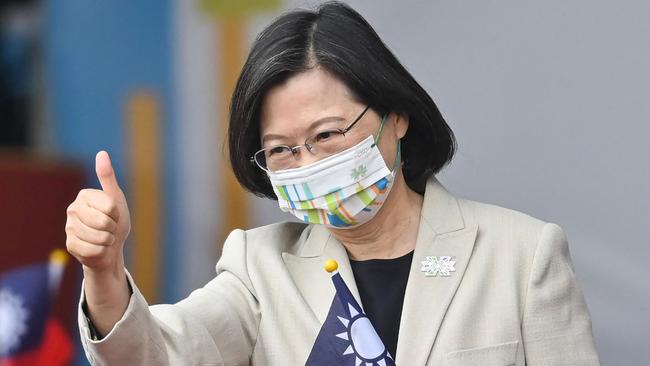Taiwanese chief Tsai Ing-wen vows no let-up on liberty
Tsai Ing-wen tells Beijing her people will never give up democracy, urging China to find a ‘mutually agreeable arrangement’ to preserve peace.

Taiwanese President Tsai Ing-wen has told Beijing her people will never give up their democratic way of life and urged China to find a “mutually agreeable arrangement” to preserve peace.
In a national day speech that directly addressed the rising security concerns in the Taiwan Strait following Russia’s invasion of Ukraine, Ms Tsai on Monday tried to urge Beijing to de-escalate its aggression.
“I want to make clear to the Beijing authorities that armed confrontation is absolutely not an option for our two sides,” she said.
Speaking only two months after Beijing blasted 11 ballistic missiles over and around Taiwan, Ms Tsai mixed defiance with an attempt at reassurance.
She said Taiwan looked forward to resuming “healthy and orderly cross-strait people-to-people exchanges” as the Covid pandemic tampered, which would “(ease) tensions in the Taiwan Strait”.
After outlining her government’s ongoing plans to increase its “asymmetric warfare capabilities”, Ms Tsai then urged Beijing to join it in dialogue.
“Provided there is rationality, equality and mutual respect, we are willing to work with the Beijing authorities to find a mutually agreeable arrangement for upholding peace and stability in the Taiwan Strait. This is our shared responsibility,” she said.
Taiwan and China split at the end of the civil war in 1949. The communist party has vowed to bring Taiwan’s 23 million people under its rule and has said it will use force if necessary to deter it from formally declaring independence.
Beijing’s military threats have increased during President Xi Jinping’s decade in power, which will be extended by another five years at a communist party meeting that starts on Saturday.
Mr Xi, who has unsettled many in the international community with his close relationship with Russia‘s President Vladimir Putin, has overseen the ramping up of diplomatic, economic and military pressure on Taipei in recent years.
On Monday, Ms Tsai said becoming part of China was not acceptable to people in Taiwan, which has become a progressive democracy with a distinct Taiwanese identity.
“During the past 73 years, the people of Taiwan have lived and grown together on this land, and have formed our own strong sense of identity and belonging,” she said. “The broadest consensus among the Taiwanese people and our various political parties is that we must defend our national sovereignty and our free and democratic way of life. On this point, we have no room for compromise.”
The US and other partners have urged Taiwan to adopt an asymmetric “porcupine strategy” with increased urgency following Russia’s invasion of Ukraine. Ms Tsai addressed this strategic shift directly in her speech, in front of an audience that included Surangel Whipps Jr, the President of the Pacific Island country of Palau, one of Taiwan’s 13 formal allies.
She said Taiwan was ramping up the mass production of precision missiles and high-performance naval vessels. “In addition, we are working to acquire various small, highly mobile precision weapons that will help us develop comprehensive asymmetric warfare capabilities, ensuring that Taiwan is fully prepared to respond to external military threats,” she added.
She also reiterated the need to mobilise and train more civilians to work with the military, a strategy that Ukraine successfully adopted after Russia’s invasion. “Every citizen is a guardian of our nation,” she said.
Wen-Ti Sung, an expert on Taiwan-China relations at the Australian National University, said Ms Tsai had given a “smart speech” pitched at a varied audience of domestic Taiwanese, like-minded partners and Beijing. Mr Sung said the Taiwanese President’s attempt to reassure its partners that it was open to dialogue on acceptable terms was notable.
“If Taipei leaves the door open, it gives Beijing less time pressure to use options other than peaceful talks to deter independence,” he said.




To join the conversation, please log in. Don't have an account? Register
Join the conversation, you are commenting as Logout